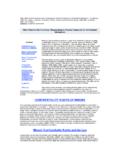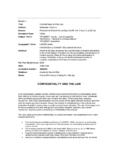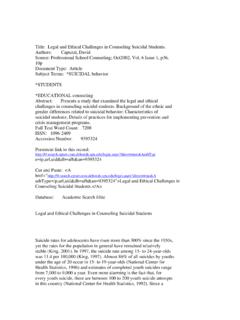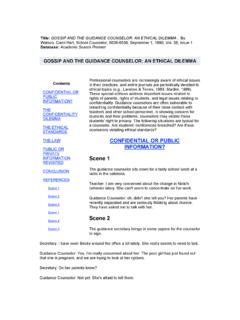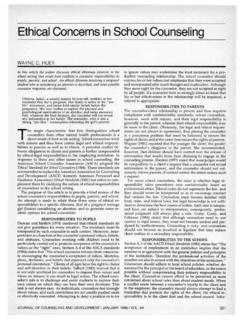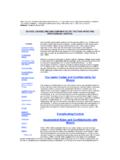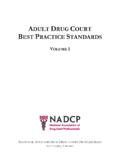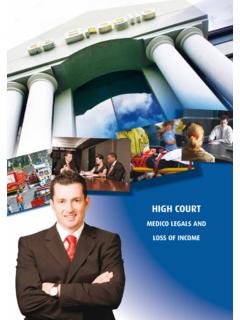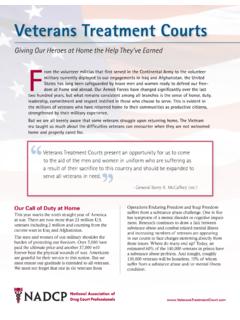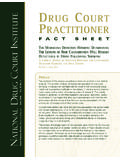Transcription of Section: PREPARING TO TESTIFY: THE SCHOOL …
1 Title: PREPARING TO testify : THE SCHOOL COUNSELOR AS court WITNESS , By: James, Susan Hackbarth, DeVaney, Susan B., SCHOOL Counselor, 0036-6536, November 1, 1995, Vol. 43, Issue 2 Database: Academic Search Premier section : features PREPARING TO testify : THE SCHOOL COUNSELOR AS court WITNESS Throughout our nation's history, the public schools have been called upon to address social ills. Perhaps more than any time in history, however, today's schools carry responsibility for managing matters of suicide and violence, drug abuse, child neglect, and child pregnancy--situations that ultimately may lead to litigation. Counselors, as SCHOOL staff members, are most likely to work with children and their guardians on sensitive issues, and are finding themselves increasingly facing legal responsibility both for their own actions and for the actions of their clientele (Davis & Ritchie, 1993).
2 As citizens rely more heavily on the court system to resolve civil matters and as child involvement in crime increases, the likelihood of the SCHOOL counselor serving as a witness rises. Counselors may find themselves rendering testimony in matters of personal injury, divorce, wrongful death, special education placement, child abuse, or child custody (LaForge & Henderson, 1990; Remley, Jr., 1985). Testifying in court can be a frightening prospect (Brodsky, 1991; Krieshok, 1987). People having little or no court experience may rely on idealized notions of the legal system to form their expectations of testimony (Mac Hovec, 1987).
3 Although the ultimate objective of the judge and jury is truth and resolution, practically speaking, the courts are a forum for conflict. The language of the courtroom is that of debate, argument, and persuasion. Each attorney tries to present: the winning argument and discredit opposing litigants and their witnesses (Mac Hovec, 1987). Mental health professionals by training encourage communication, offer support, reach compromise, and Change notions of a troublesome external situation to reduce internal turmoil. Even the counselor's vocabulary connotes possibilities, tolerance of discrepant viewpoints, and invitation to build relationships.
4 Although middle ground ultimately may be reached, it is no wonder that the counselor may be particularly uncomfortable in a setting where the litigants' goal is resounding victory, not peaceful resolution (Remley, Jr., 1991). It is the purpose of this article to inform SCHOOL counselors of what they may encounter as witnesses, thereby enhancing preparation, comfort, and performance on the witness stand. TYPES OF WITNESSES The courts recognize two kinds of witnesses: the expert witness and the general or "fact" witness. "An expert is any person who, by virtue of his or her training or experience in a science, a trade, or an art, has information that is not likely to be known by the average juror" (Blau cited in Krieshok, 1987, p.)
5 69). It is the function of the expert witness to educate the judge and jury in any adversarial procedure, be it civil, criminal, federal, state, or local court . Trial judges use personal discretion to ascertain the qualifications of the potential expert. No encompassing set of standards exists to measure degree of experience or expertness; therefore a witness may be challenged in court by others with the same or greater level of expertise (Remley, Jr., 1985, 1991; Weikel, 1986). A SCHOOL counselor could be called upon to serve as expert in matters of standardized testing, child growth and development, effective parenting, or emotional needs of children (Remley, Jr.
6 , 1985). Expert witnesses should come to court with a solid knowledge base in their field of expertise and ready to render an opinion based on their knowledge of the topic (Remley, Jr., 1985; Weikel, 1986). When a witness renders an opinion, it "derives from analysis of the case, including a review of relevant facts and case records, drawing the requisite inferences, and making appropriate interpretations" (LaForge & Henderson, 1990, p. 456). SCHOOL counselors serving as experts should possess professional credentials qualifying them to serve in that capacity. Expert witnesses are advised to be impartial (Weikel & Hughes, 1993).
7 As an expert with knowledge of a psychological, technical, or specialized nature, the counselor-expert is asked to impart data to the judge and the jury in precise, neutral, and understandable terms (La-Forge & Henderson, 1990; Weikel, 1986). The expert's case presentation should be organized using fact, logic, and a specific theoretical framework (Miller, Kaplan, & Gardner, 1994). In addition to serving as an expert, witnesses may also act in a "lay" or "general" capacity wherein they relate information but not opinions about the circumstances of a particular situation (Mason, 1992; Remley, Jr., 1991). Contents TYPES OF WITNESSES PRELIMINARY CONSIDERATIONS PREPARATION FOR TESTIMONY THE COUNSELOR'S TESTIMONY CONCLUSION REFERENCES Because SCHOOL counselors are more likely to be called as general witnesses, the remainder of this article focuses on the SCHOOL counselor as a witness of fact.
8 Counselors desiring additional information concerning expert testimony are advised to consult Brodsky (1991), Krieshok (1987), LaForge and Henderson (1990), Mac Hovec (1987), Weikel and Hughes (1993), and Wills (1987). PRELIMINARY CONSIDERATIONS Professional preparation for SCHOOL counselors is undergirded by a knowledge of the counselor's role and the ethical standards accepted by the profession. Whether or not a SCHOOL counselor ever testifies in court , familiarity with the American SCHOOL Counselor Association role statement and statement of ethical standards (ASCA, 1990, 1992) and the Ethical Standards of the American Counseling Association (ACA, 1993) form a groundwork for development of professional relations with parents, students, and colleagues.
9 Successful counseling programs and services are based on this foundation. For example, SCHOOL counselors recognize that they generally do not have the time, resources, or training to enter into long-term therapy with students. Rather, the counselor makes a referral through the child's parent or guardian, perhaps to a mental health counselor or agency. Operating from this procedural base, counselors will know how to respond, for example, when asked by parents to serve as an expert witness in a child custody or abuse case. By knowing one's professional obligations and limitations, the SCHOOL counselor might avoid inappropriate entry into court by explaining that a mental health professional specializing in impartial family evaluations may be a more appropriate expert witness.
10 This clear communication regarding professional roles corresponds to the statement in the proposed revision of the ACA ethical standards that professional counselors "are accurate, honest, and unbiased in reporting their professional activities and judgments to appropriate third parties including courts" (ACA, 1993, p. 19). A second factor to be considered is record keeping. SCHOOL professionals should keep in mind both the Buckley Amendment, which gives parents access to student records, and the fact that a court may subpoena a counselor's records (Remley, Jr., 1991, 1993). Careful records can prevent lawsuits against the counselor or the SCHOOL when, for example, they record the onset and nature of the problem, consultation and treatment strategies, and referral or problem resolution.

